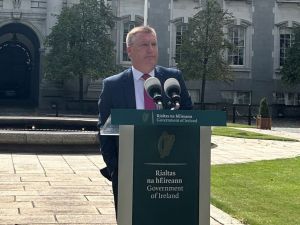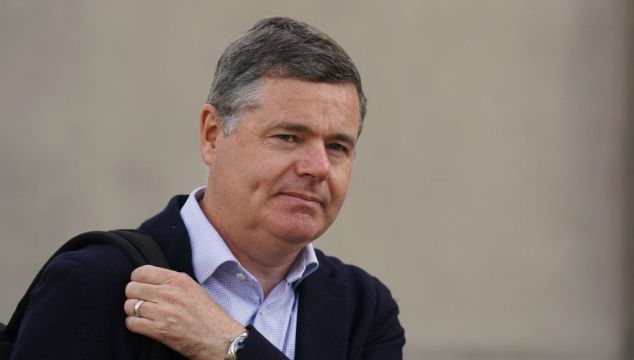Minister for Public Expenditure Paschal Donohoe has said possible cuts to the Universal Social Charge in the budget will be a decision for the Minister for Finance to make.
In an interview on RTÉ's Morning Ireland, Mr Donohoe said he and Michael McGrath were “on the same page” and he had every reason to expect that will continue.
He said both he and Mr McGrath were “committed to safety in public finances.”
"Because we know that is the best insurance policy for our country being able to grow its living standards, being able to withstand external shocks in the years ahead while investing in our public services today. And I know that approach will continue in Budget 2024."
Mr Donohoe said there was precedent for making changes to the Universal Social Charge (USC).
"We have changed Universal Social Charge before. We are many weeks away from the Budget being decided and Minister McGrath and I will work co-operatively and closely together on it. Universal Social Charge has been reduced in the past.
"The key thing is at a time at which inflation is leading to employers who are able to give wage increases giving wage increases to help workers against the pressures in the standard of living that we want to ensure that workers don’t pay a higher rate of tax just because they get a wage increase.
"And how that can be achieved is something Minister McGrath, myself, the Government will work on in the weeks ahead."
Mr Donohoe said that due to the budget surplus, the Government was in a position to be able to invest in tax changes and better public services while assisting with the cost of living challenges facing Irish people.
He acknowledged that the needs of the HSE were "significant."
"There are various estimates in relation to what the estimate of HSE funding needs will be later on in the year. I am working on that at the moment with the Department of Health.
"There are many, many meetings. There was an engagement there last week. It has been a perennial feature of budget management over the last number of years the role of health expenditure.
"But the reason why health expenditure is an important part of our Budgetary negotiations is because of how busy our hospitals are and the huge difference they can make and are making to the health of our country where they are doing such vital work."
Fiscal Advisory Council
Mr Donohoe said the Government had acted upon the "broad thrust" of what the Irish Fiscal Advisory Council had advised on the forthcoming budget.
"We are aiming to grow Government expenditure by 6.2 per cent, bringing overall expenditure to €91.2 billion. As the Taoiseach has also said, and I have said on countless occasions, the broad thrust of what the Fiscal Advisory Council have recommended we have acted upon.
"The Fiscal Advisory Council has said we should be running surpluses and we should not be feeding an increase in corporate tax receipts into day-to-day Government spending or lower taxes.
"That is why we believe we are going to be able to run a surplus of €10 billion this year. Because we don’t want to spend money we might not have tomorrow on day-to-day spending and we are aiming to increase that surplus again next year.
"I appreciate this is a difficult argument to make with all the needs, with all the demands that so many causes that people have at the moment, but I have been around before when that money ran out and myself and Minister McGrath don’t want that to happen."
He said in August last year there was a “very large additional increase” in corporate tax receipts, with August this year looking very different.
"But I think it is still worth noting that corporate tax revenue overall for this year is still up. It is up by 7 per cent versus a year ago.
"As Minister McGrath has said we will have to take a look at where we are in November in particular to see if it is part of a broader trend."
Responding to speculation over cuts to the USC, Dr Eddie Casey, chief economist at the Irish Fiscal Advisory Council, said the Government should be mindful of "pushing to do too much" in the current environment.
He told RTÉ's Today with Claire Byrne: "You will always have one [person] saying 'taxes are too high we should reduce them' and you will have another who will say 'services need to be better and we need to expand infrastructure.'"
"But it is up to the Government of the day to make the grown up choices. Recognising that some of these are going to be very difficult and we can go too far."
"One of the ways we can ensure we don’t go too far is to stick to something like the spending rule the Government sensibly introduced back in 2022. The idea of a spending rule is like a speed limit. It is there to keep us safe. To make sure that everything is kept sustainable and that we don’t risk a crash in the future."
'Difficult choices'
Limerick Fianna Fáil TD Willie O’Dea told the same programme that the Government had made "difficult choices" over the years.

“They have taken difficult decisions and as a result the economy is in much better shape. I understand what Eddie is saying. His organisation has been established to advise the Government on economic matters.
"But the Government is not just managing an economy it is managing a society also. You can talk about disability and the needs for public expenditure on justice, etc. All those are necessary.
"The spending rule is being breached this year, but you must remember we have been through a period of very substantial inflation and people’s purchasing power has been substantially eroded.
"The fact of the matter is that the USC was brought in during a time of severe economic crisis. Now we are in a position to take a lot of [lower paid workers] out of the USC.”







